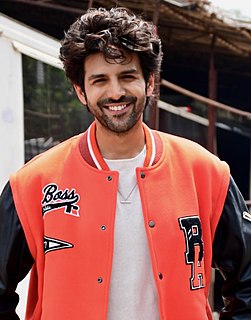A Quote by Colin Farrell
You have a certain objectivity, as a member of the audience, and you can come away maybe being provoked into a certain discourse or a certain arena of questioning, regarding how you would deal with things that your character has to deal with. Whereas when you're doing a film, once you start asking, "What would I do?," you're getting the distance greater between yourself and the character, or you're bringing the character to you, which I think is self-serving, in the wrong way. The idea is to bring yourself to the character.
Quote Topics
Related Quotes
When you go for something because you're curious about it, you get psyched up about the chance of getting into it. It's like an actor meets a role, and you slip into that body and see what happens, to experience certain conditions, to adopt a certain character. Even shooting is a study of the character. I think both the character and the actor, and eventually the filmmaker - myself - are finding a way to accept their environment and being accepted and feel comfortable of themselves.
Sometimes you can do certain things on stage, or even in a TV series, and people see the look on your face and they know what you mean, so you can get away with certain things. But if you can't create that look on an animated character, which is essentially a puppet, the line will hit the audience in a very bad way.
But, as an actress, you don't want to run into these scenes, willy-nilly. The couple that I did do were important for the character and essential to the plot, to show what was actually going on between each character. It is great to be able to have that, and to be able to say certain things and have certain passions.
When you're no longer seeing yourself, in some ways. You're as close to being as you can be.I suppose that's consistent with the moment that the mind actually turns off, and is no longer questioning what you're doing. When the questions stop, that's when the real acting takes over. And trying to get to the point where the questions stop, "Would I do this? How do I feel about that as a character?" When those stop, and it's just doing X, Y, and zed, because that's what you'd do as this character, because you're inside this character somehow - that's when it really kicks off.
One thing I've learned as an actor as well as a producer is to trust my own instinct. When I first started acting I would sometimes have ideas about certain things, whether it's a scene, or a character or certain dialogue, that wouldn't be followed. I was never in a position to have the power to press the matter. Sometimes it wasn't even about my character. But I'd watch the movie afterwards and think I was right.
Your character is your destiny. Building character is a task for the brave and dedicated. There are no shortcuts when it comes to building character. If you wish to cure minimalism in your own life, to develop a complete commitment to excellence and an absolute rejection of mediocrity, the question you need to start asking yourself is, "What is the most I can do?"
It really depends on what the screenplay is asking of you, and what your responsibility is to that character. You have the author's intent to deal with, you have the filmmaker's vision, and then you have your own wants, desires and needs for the character. It's collaborative. But I knew, right off the bat, that there was no way to go into some sort of pink-haired, clown-nosed character with Ronald McDonald shoes.
When you are writing, you have to love all your characters. If you're writing something from a minor character's point of view, you really need to stop and say the purpose of this character isn't to be somebody's sidekick or to come in and put the horse in the stable. The purpose of this character is you're getting a little window into that character's life and that character's day. You have to write them as if they're not a minor character, because they do have their own things going on.


































